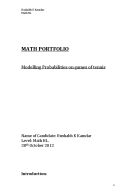TASK 1
--------------------------------------
Explanation:
Note that Ann wins if her die is higher than Bob's die, Bob wins in the event of a tie, and neither wins if Bob's dice is higher than Ann's - we should clearly see that Ann's probability of winning should be higher than Bobs's and the probability of NONE Wins should be also higher than the probability of Bob's win, while probablity of Ann's Win and NONE Wins should be the same. Therefore, the solution...
(The bold combinations are cases in which Ann wins.)
Solution:
A = case where Ann is winning
B = case where Bob is winning
N = case neither Ann and Bob is winning
Since both have dices with 6 sides, the total number of combinations when both rooling is 6 x 6 = 36.
The dice will match 6/36 of the time. Means in 6/36 of the time both will have equal number on the dice.
Each player will have the higher number in 15/36 of the time.
P(Ann)=15/36
P(Bob)=6/36
P(Neither)=15/36
With ties going to Bob, Ann wins 15/36 or total of 41.6666...67% => ~41.7%.
--------------------------------------
TASK 2
--------------------------------------
Solution:
First:
1-(21/36)^2 is the chance for Ann to win if, when she loses the first time, both of them roll again.
The easiest way to solve the two rolls for Ann problem is to consider all of Bob's possible rolls.
Bob rolls 6 - Ann cannot win
Bob rolls 5 - Ann wins 11/36 of the time. Prob of bob rolling 5 = 1/6, so total Ann winning chances = 11/216
Bob rolls 4 - Ann wins 20/36 of the time... 20/216
Bob rolls 3 - Ann wins 27/36 of the time... 27/216
Bob rolls 2 - Ann wins 32/36 of the time... 32/216
Bob rolls 1 - Ann wins 35/36 of the time... 35/216
Ann wins a total of 57.8% of the time
Second:
In case when Ann is rolling for the second time is only happened when both Ann and Bob didnt win the first roll.
The probability is:
P(N) * P(A)= 15/36 * 15/36
--------------------------------------
TASK 3 & 4
--------------------------------------
Solution:
There are two cases when both players can roll their dice two times:
Ann is winning: P(N) * P(A) = 15/36 * 15/36
Bob is winning: P(N) * P(A) = 15/36 * 6/36
Rolling to infinity and Ann can then win the game:
Winning - 1st roll = 15/36
Winning - 2nd roll = 15/36 * 15/36
Winning - 3rd roll = 15/36 * 15/36 * 15/36
Sum of all (with geometric progression)
S = t_1 / (1-r)
S = (15/36) / (1-15/36)
S = 15/21
and Bob win the game
Winning - 1st roll = 6/36
Winning - 2nd roll = 15/36 * 6/36
Winning - 3rd roll = 15/36 * 15/36 * 6/36
Sum of all (with geometric progression)
S = t_1 / (1-r)
S = (6/36) / (1-15/36)
S = 6/21
--------------------------------------
TASK 5
--------------------------------------
Solution:
In a casino, whenever a player rolls the die, the player has to pay the bet. In such case, the total cases where neither the player or bank are winning is in favour to the bank's side.
A = case where player is winning. P(A) = 15/36
B = case where bank is winning. P(B) = 21/36
P is pay out, the amount of the bank pays if the player win.
V is betting value, the amount of money the player has to pay each time she/he wants to play.
Now, lets calculate for a fair game
E = P(A) * P - P(B) * V
0 = 15/36 * P - 21/36 * V
so we have the ratio P = 21/15 * V
In case they roll to infinity and the player finally win the game
Winning - 1st roll = 15/36
Winning - 2nd roll = 21/36 * 15/36
Winning - 3rd roll = 21/36 * 21/36 * 15/36
Sum of all (with geometric progression)
S = t_1 / (1-r)
S = (15/36) / (1-21/36)
S = 15/15
This cannot be right because the calculated probability is 1.
Bank wins the game
Winning - 1st roll = 21/36
Winning - 2nd roll = 15/36 * 21/36
Winning - 3rd roll = 15/36 * 15/36 * 21/36
…
Sum of all (with geometric progression)
S = t_1 / (1-r)
S = (21/36) / (1-15/36)
S = 21/21
This cannot be right because the calculated probability is 1.







